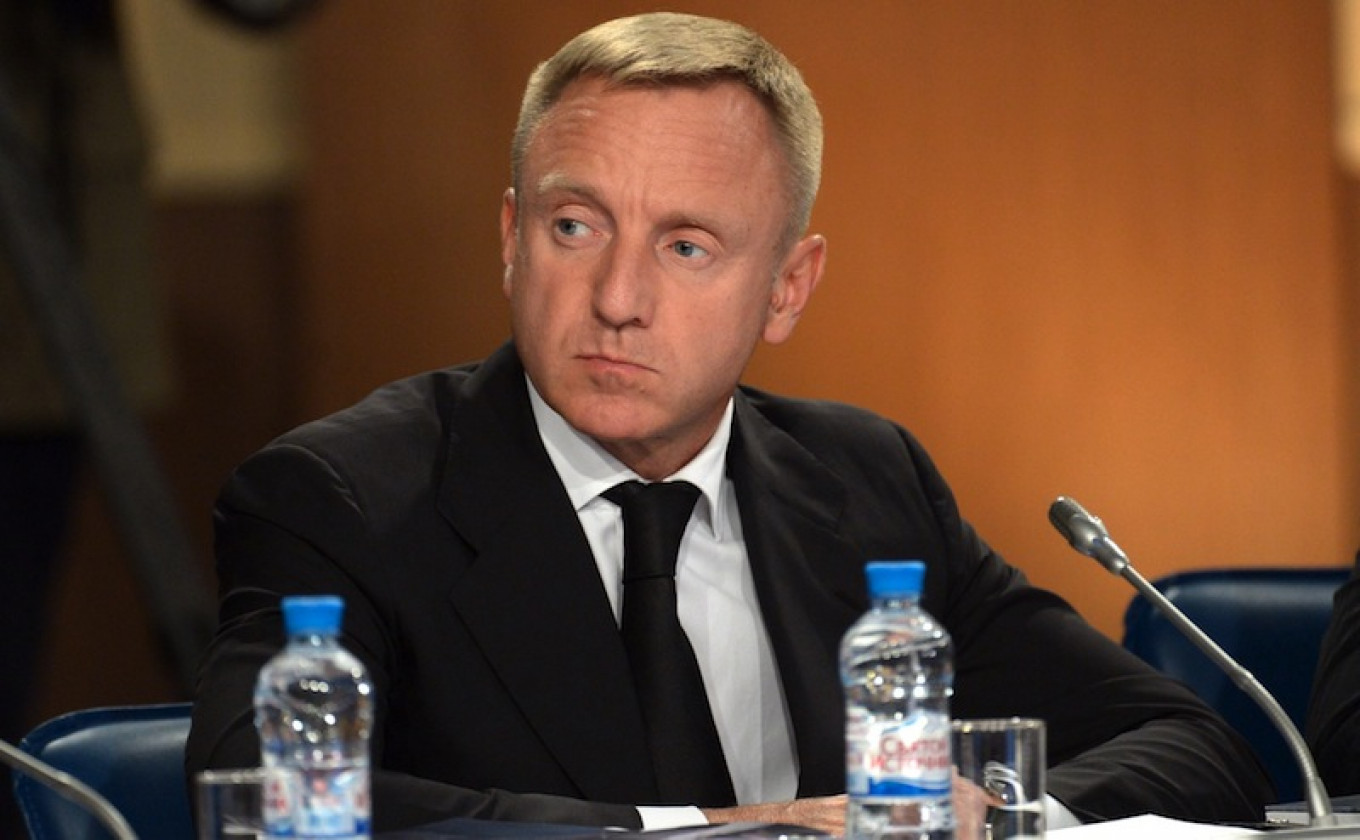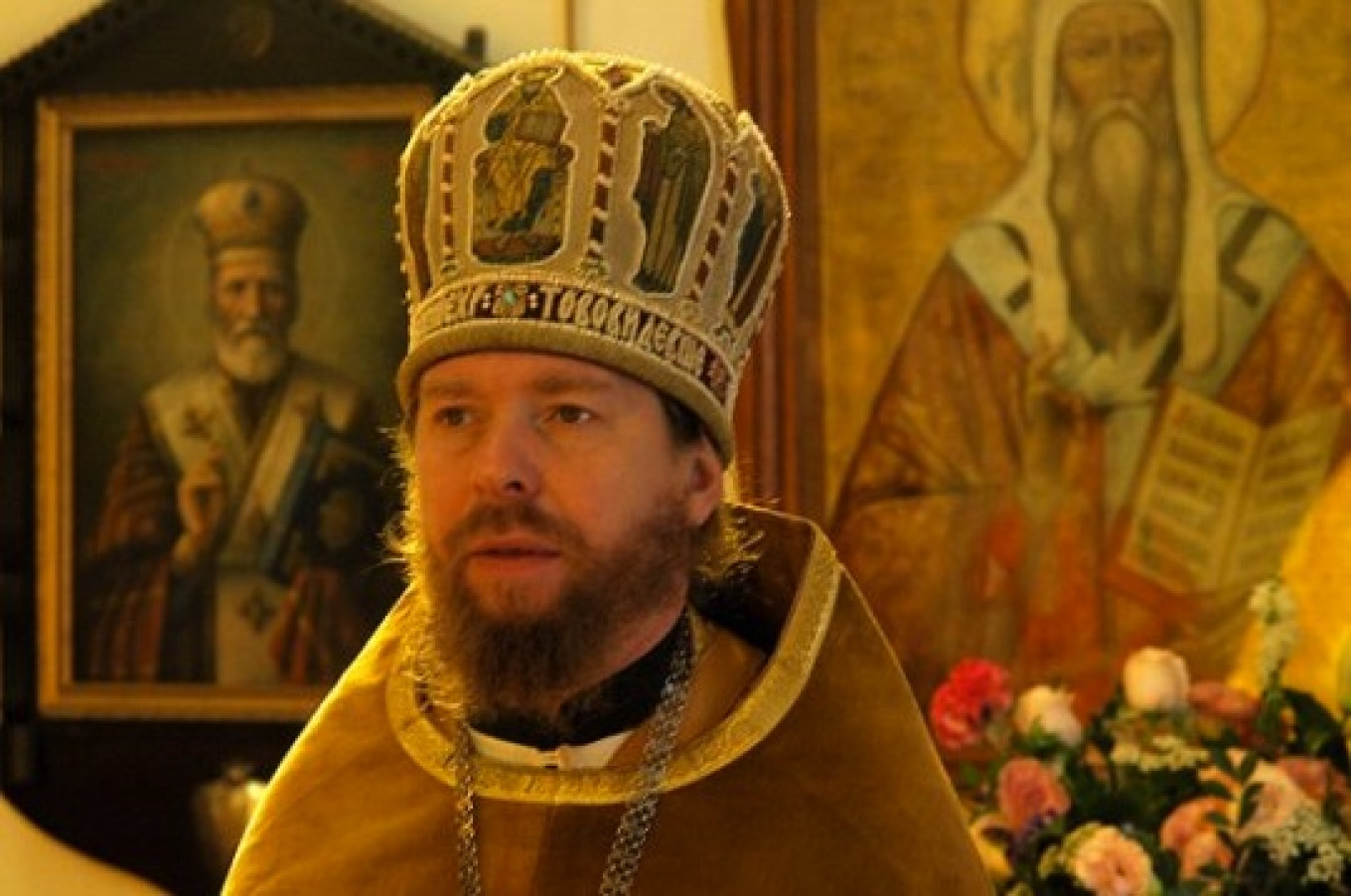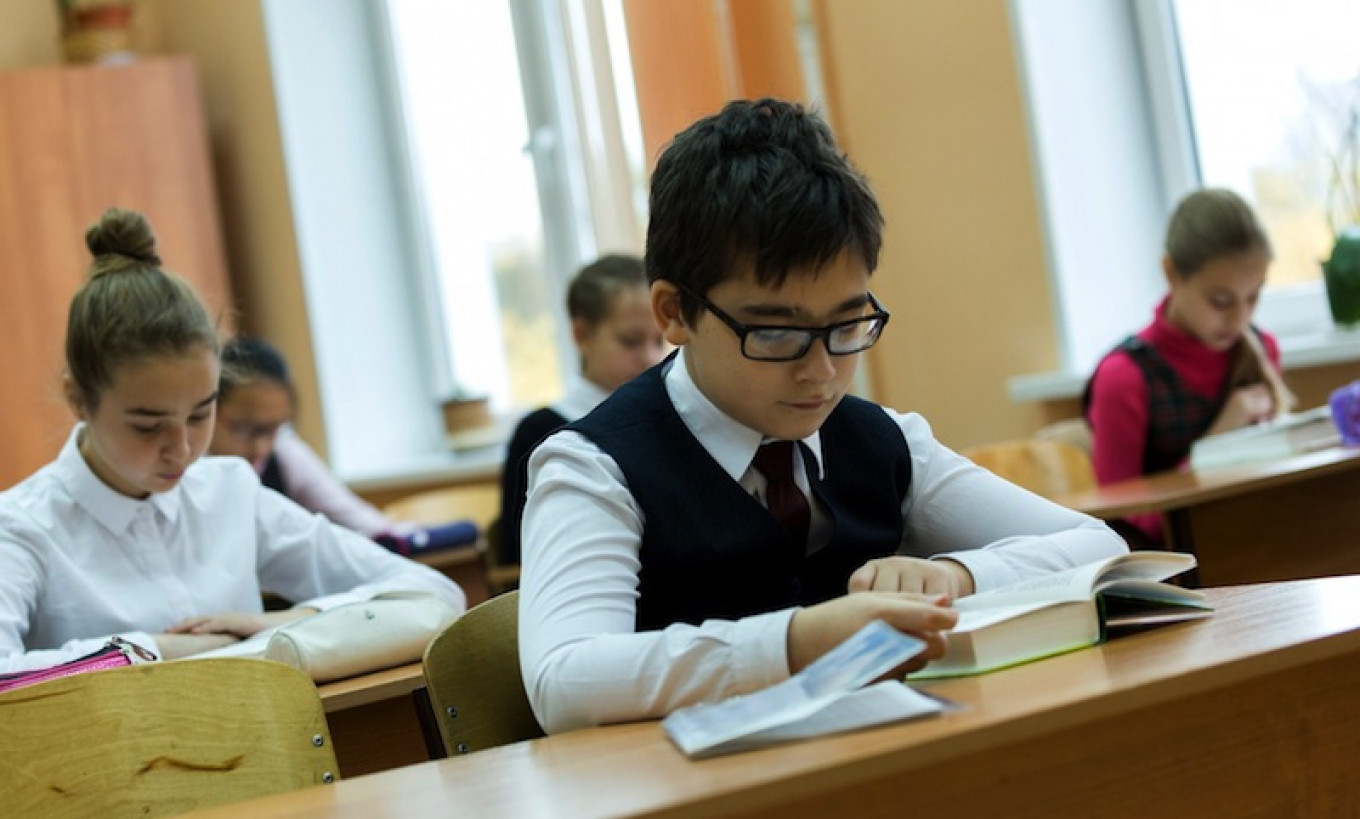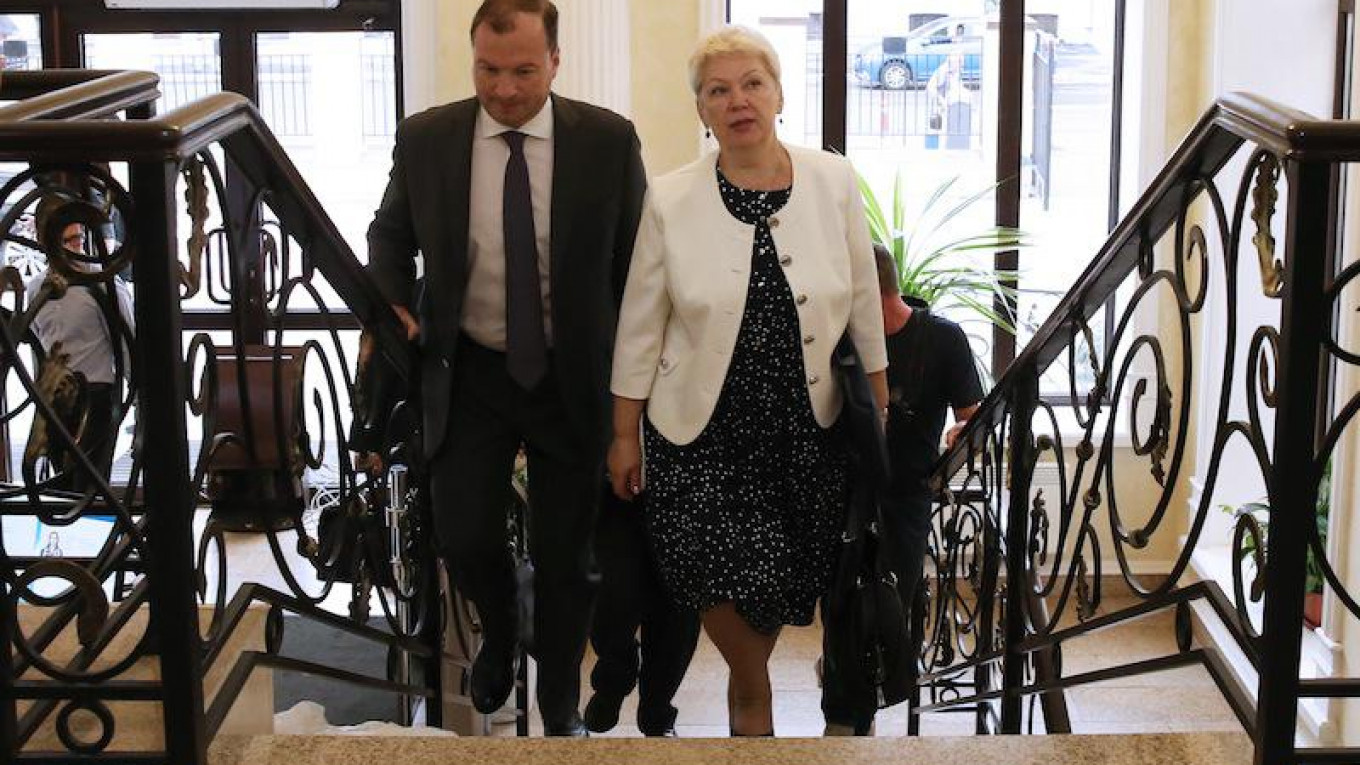For Olga Vasilyeva, it wasn’t the breadlines and high crime rates that made early post-Soviet life a daily trial. It was the public reassessment of the country’s recent, and bloodied, history.
“[The goal was] to blacken the past, to remove from the social consciousness the value of tradition, pride for the greatness of one’s country, culture and language,” she told an audience of teenagers at a seminar on patriotism in late June.
“Astonishing myths” abounded in the 1990s, she said, as she singled out the Ogonyok news magazine that was symbolic of the glasnost era. “If you look at the number of deaths and those repressed [under Soviet rule] cited in Ogonyok, it becomes completely unclear who was left alive at all!” she added, hinting that the figures were greatly exaggerated.
Statements such as these have alarmed some Russians after Vasilyeva, a woman in her 50s with cropped blonde hair and gold-rimmed glasses, was installed as education and science minister on Aug. 19.
While some in the academic community expect her appointment to usher in a new era of dialogue, critics stumble over Vasilyeva’s allegedly positive references to Soviet dictator Josef Stalin and her ties to the Russian Orthodox Church.
Is the blend of religious conservatism and patriotism that has accompanied President Vladimir Putin’s third term in power about to come knocking at schools’ doors? they ask.
Moscow history teacher Tamara Eidelman thinks it might. “Vasilyeva’s appointment is a sign of the general atmosphere in the country toward faux patriotism and Stalinism,” she says. “And that, sadly, will of course also impact schools.”

A Bone to Voters
The removal of Vasilyeva’s predecessor, Dmitry Livanov, did not come as a surprise: There have been calls for his resignation for almost as long as he was education minister.
Appointed in 2012, Livanov made few friends by pushing through far-reaching reform to reduce state dependence and improve efficiency in education. Among his most controversial moves was an overhaul of the Russian Academy of Sciences by merging research institutes and cutting funding. He also enforced the implementation of a unified state exam.
It gained him the reputation of an uncompromising technocrat and made him widely unpopular with a sector accustomed to Soviet-era support.
In popularity surveys, Livanov has consistently placed near the bottom. A recent survey of government ministers by the state-run VTsIOM pollster ranked Livanov the Kremlin’s most unpopular staff member, with his lowest score in years.
With parliamentary elections less than a month away, on Sept. 18, Livanov’s sacking fits a tradition of throwing a bone to voters by purging unpopular government officials. Compared to Livanov, Vasilyeva is “a new leaf,” head of VTsIOM Valery Fyodorov told the Vesti news program.
Russia’s academic elite embraced the news. “We hope that reform from now on will be more balanced, rational,” Vladimir Fortov, the head of the Russian Academy of Sciences, told the state-run RIA Novosti agency.
The Kremlin has presented the choice of Vasilyeva as inspired by gender equality issues. “I would propose appointing a woman,” a serene Prime Minister Dmitry Medvedev told Putin in a staged meeting broadcast on state television.
More likely, however, is that Vasilyeva’s history, not her gender, snagged Russia’s first female education minister the job.

Lucky Meeting
Vasilyeva, who declined a request for comment for this article, grew up in a Russian Orthodox household in the 1960s. It was a time when “any information on a baptism, christening, religious wedding or funeral was passed on to the executive committee,” she told the religious Pravoslavie.ru website in an interview.
“Nevertheless, my father, who had a certain position, wanted his children to be baptized,” she said. After graduating early at the age of 14, she studied choir directing and later history, going into teaching and then academia.
As a prominent religious scholar, Vasilyeva focused on the relationship between the state and the Russian Orthodox Church in the 20th century, publishing more than 90 papers on the topic. At a religious seminar, she met then-Archimandrite Tikhon Shevkunov, a Russian Orthodox priest rumored to be Putin’s spiritual adviser. Many believe that relationship has played a crucial role in her dealings with the Kremlin.
Her ties to the church are such that upon her appointment, Patriarch Kirill, the head of Russian Orthodoxy, congratulated her in a statement on the church’s official website. “The Lord has generously endowed you with talent, which you have successfully made use of in the many stages of your service,” it said.
Those links have alienated Kremlin critics such as Alexei Venediktov, editor-in-chief of the Ekho Moskvy radio station, who promptly announced his resignation from a ministry advisory body. “She believes the church should be close to schools, and the state to the church,” he said. “Nothing good can come of this appointment.”
Others argue Vasilyeva’s views on history, not her religious zeal, are more cause for concern.
In a closed lecture given to Kremlin officials in 2013, Vasilyeva reportedly praised Stalin for uniting the country on the eve of World War II, according to an unnamed source cited by the Kommersant newspaper at the time.
Reports of ambiguous statements on Stalin abound and, upon her appointment as minister, Russian liberal media have rehashed them to decry her political leanings. Vasilyeva’s supporters have dismissed the allegations as based on misquotations and defend her public statements on Stalin as historical appraisals based on fact, rather than value judgments.
Less unequivocal is Vasilyeva’s championing of patriotic values. Previously, Vasilyeva was deputy head of the presidential administration’s “social projects” body, tasked with advising the government on issues of patriotism. The group was overseen by Vyacheslav Volodin, the deputy head of the presidential administration and brain behind domestic policy.
In her work in the presidential administration, Vasilyeva played a key role in preparing new teaching material on Russian history and literature. There, she took a firm line, according to a source who had crossover with Vasilyeva at the time and asked to remain anonymous. “She very sharply, almost rudely, tried to push through a line of ideology on the one hand, while reducing plurality on the other,” says the source. “She sees history as the study of truth, rather than an ideological debate.”
Her appointment, the source adds, is the result of a tug-of-war within the Kremlin. “When faced with an opportunity to put his own person in the position, Volodin went for it,” the source says. “Medvedev was presented a done conclusion.”

Wait and See
So far, Vasilyeva has given little away about her plans as minister, saying only that Livanov’s reforms will be “reviewed.” In her first public appearance, she said her main priority as minister would be to defend the interests of teachers.
“Their position, their state, society’s attitude toward them,” she told a teachers’ conference, dressed in a black gown with long sleeves — not unlike those worn by Orthodox priests.
Former student Katya Bolotovskaya enthusiastically
remembers Vasilyeva’s lively music and history lessons at a Moscow
school in the late 1980s. “She was a wonderful teacher, better than
all the others,” she says.
Bolotovskaya could never have predicted
that her teacher would one day become the country’s education
minister. Now, more than excitement, she feels alarm. “It scares me that the education minister would
have such pro-church, pro-government values,” she says.
Moscow history teacher Eidelman believes it’s too soon to tell. “It would be premature to judge Vasilyeva on her words,” she says. “But, to be honest, her words inspire fear.”
A Message from The Moscow Times:
Dear readers,
We are facing unprecedented challenges. Russia's Prosecutor General's Office has designated The Moscow Times as an "undesirable" organization, criminalizing our work and putting our staff at risk of prosecution. This follows our earlier unjust labeling as a "foreign agent."
These actions are direct attempts to silence independent journalism in Russia. The authorities claim our work "discredits the decisions of the Russian leadership." We see things differently: we strive to provide accurate, unbiased reporting on Russia.
We, the journalists of The Moscow Times, refuse to be silenced. But to continue our work, we need your help.
Your support, no matter how small, makes a world of difference. If you can, please support us monthly starting from just $2. It's quick to set up, and every contribution makes a significant impact.
By supporting The Moscow Times, you're defending open, independent journalism in the face of repression. Thank you for standing with us.
Remind me later.






